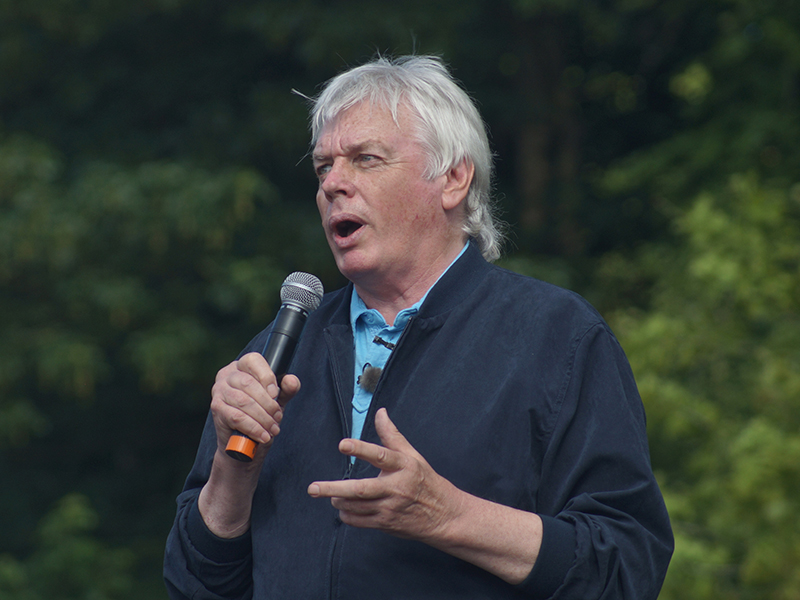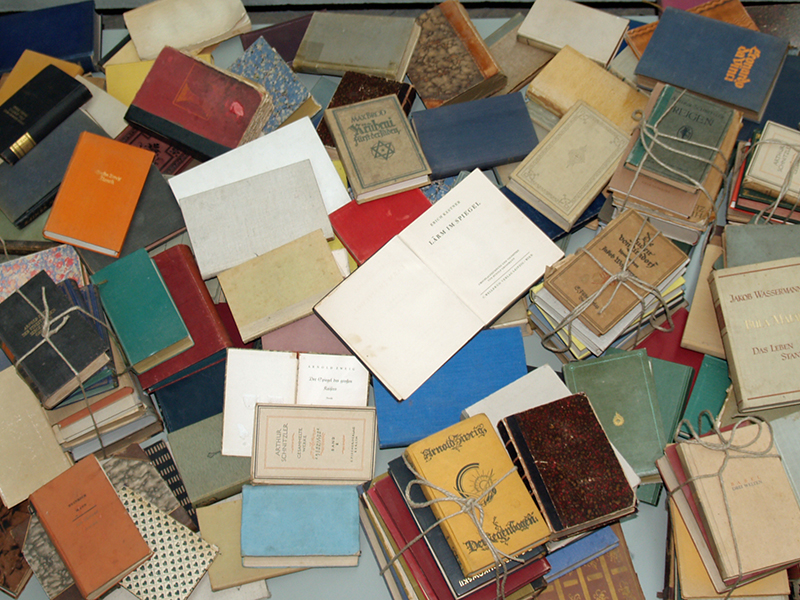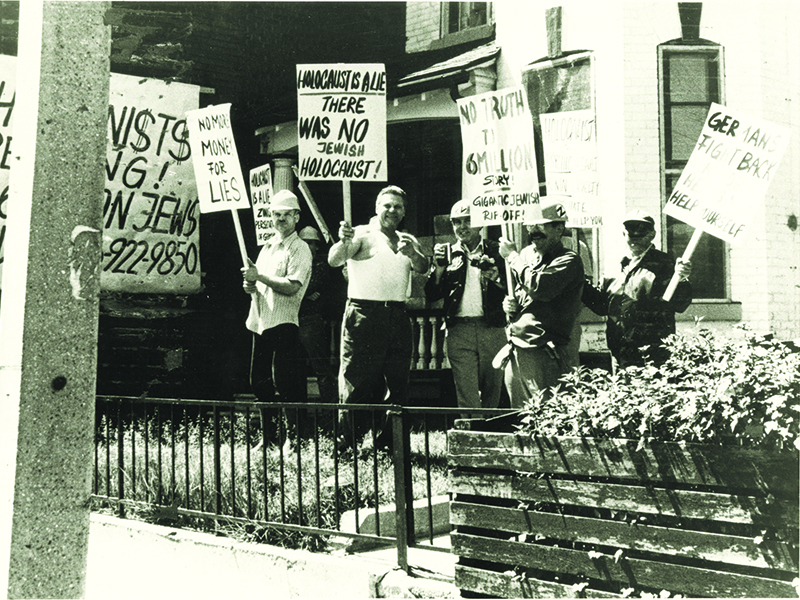“The era of extreme Jewish intellectualism is now at an end,” Joseph Goebbels, Nazi Germany’s minister of propaganda, told a crowd of students in Berlin on May 10, 1933, when the German Student Union stormed libraries and bookstores across the country, burning upwards of 25,000 books that were written by Jews, or otherwise deemed to be “un-German.”
That day is generally considered to be the start of the Nazi party’s campaign of ruthless censorship and its attempt to erase Jewish thoughts, ideas and expression from the historical record. By one estimate, the Nazis destroyed over 100-million books, in what Jonathan Rose, editor of The Holocaust and the Book, calls “the most devastating literary holocaust of all time.”
This, of course, was not the first, or the last time the Jewish People would be the victims of censorship. Even the United States – with its First Amendment protections of freedom of speech and of religion – has a history of stifling Jewish expression. This is perhaps best exemplified by Anthony Comstock, the architect of America’s 1873 obscenity laws, who had a history of making anti-Semitic comments and was supported by noted Jew-haters. Comstock and his New York Society for the Suppression of Vice used the obscenity laws to specifically target Jewish authors and editors. By the 1930s, 90 per cent of those charged with obscenity were Jewish.
It’s little wonder, then, that many of the writers, lawyers and publishing houses at the forefront of the fight for free speech were Jewish. They knew they were being targeted because of their religion and that Jews have historically been the victims of censorship. This is a lesson that many seem to have forgotten.
Last June, the Jerusalem Post reported that Sears was selling T-shirts emblazoned with the logo “Free Palestine” on its U.S. website. As a result of the ensuing backlash, Sears removed the items from its websites. Walmart, which sold similar merchandise, followed suit, while online retailers Amazon and eBay came under fire for continuing to sell them.

Here, the cause was taken up by the Friends of Simon Wiesenthal Center for Holocaust Studies (FSWC), which wrote a letter to Sears Canada, asking whether the company was “promoting violence” by selling a shirt with an image of a fist on it, even though none of the offending items were sold on Sears’s Canadian website. Told at the time that other retailers, like Amazon, also sell pro-Israel T-shirts, including ones that feature the Israeli Defence Forces logo, FSWC president and CEO Avi Benlolo told The CJN that, “Those items are not projecting hate, or propaganda.”
Yet there is nothing innately hateful about saying “Free Palestine.” And if we can’t even let people express political opinions we happen to disagree with in a democratic country like Canada, what hope do we have of ever coming to an understanding with them?
We are increasingly living in a polarized and hyper-partisan world, where people on all sides – Liberal and Conservative, Republican and Democrat, Arab and Jew – speak of their opponents with such vitriol that there is little room for discussion and debate. That was the case during the 2016 U.S. presidential election, when both sides not only disagreed about which candidate was the saviour and which was the devil, but in many cases could not even agree on basic facts. It’s also increasingly routine on university campuses, where the seemingly fragile students who will become the leaders of tomorrow demand “trigger warnings” and “safe spaces” to protect them from any opinion or idea they may disagree with. And all too often, it is those who express Zionist or pro-Israel sentiments who are being targeted by students and activists.
In July 2016, Molly Harris, a student at McGill University in Montreal, filed a complaint against the McGill Daily, alleging that a “culture of anti-Semitism” at the student newspaper prevents pro-Israel voices from being published. Harris then wrote an op-ed for the Washington Post, detailing that when “I asked if a student publication would write about instances of anti-Semitism on campus in its end-of-year issue, I was told that those instances were already covered in ‘mainstream Zionist media.’ ”
The paper further enraged Jewish students when it ran a satirical piece that made fun of those opposed to the boycott, divestment and sanctions (BDS) campaign against Israel and refused to publish a counterpoint to it. Then, in November, the paper’s editorial staff responded to Harris’ complaint, saying that, “The Daily maintains an editorial line of not publishing pieces which promote a Zionist worldview, or any other ideology which we consider to be oppressive.”Jewish groups were rightly outraged at the McGill publication’s apparent infraction against freedom of speech. And yet, when British conspiracy theorist David Icke booked the city-owned Orpheum Theatre in Vancouver on Oct. 2 to give a talk, many of those same Jewish groups sang a different tune, calling for the municipal government to prevent him from speaking.

“It’s totally, totally incompatible with the City of Vancouver’s role as an open and tolerant multicultural municipality to allow Mr. Icke to speak at a city-owned facility,” Aidan Fishman, a spokesman for B’nai Brith Canada, told the CBC.
It should be noted that Icke’s ideas are so far out there – he believes that the planet is ruled by a race of shapeshifting reptilian aliens who have replaced many of our leaders, in addition to arguing that Jews have too much control over world affairs – that there is virtually no danger of his views indoctrinating any rational, thinking person.
Moreover, as Michael Vonn of the B.C. Civil Liberties Association told The CJN, “You are free to be a racist in Canada, you are free to say so and tell others that they should be, too.… Everyone who comes to see him has their charter rights involved, as well. The government should not be in a position to prevent you from hearing what you would like to hear.”
In the opinion of many free speech advocates across Canada, the government should not be picking and choosing which views get heard and which get censored. If you agree with that line of thinking, you might also question whether it is an effective strategy for Jewish advocacy groups to “fight fire with fire” by using the same tactics of trying to censor their opponents as those in the anti-Israel and anti-Zionist movements use.
Which leads to the question: how do Jewish groups decide when to engage in educational and public outreach campaigns and when to use the legal system to combat perceived incidents of hate speech?
‘You are free to be a racist in Canada.’
Avi Benlolo, president and CEO of the Friends of Simon Wiesenthal Centre, said the FSWC is “very strategic” about what it reacts to. “We don’t jump on every single issue and we are very careful with what we react to,” he said.
“We basically need to prioritize what are the real key issues that are real traumatic to the community and can have a real substantial impact, and where can we use our resources most effectively.” He admits that “the solution to anti-Semitism is education,” but says that when it comes to choosing between education and legal measures, “We don’t choose one, we choose everything.”
B’nai Brith Canada seems to have a different strategy. The organization “receives an extraordinary volume of anti-Semitic incident reports, generally between 1,000 and 2,000 per year, based on the past decade,” CEO Michael Mostyn estimates.
“We take on each and every case, working with the complainant to ensure that it is addressed and recorded in our Annual Audit of Antisemitic Incidents. We also report incidents to the police when they rise to the level of criminal behaviour.”
“While B’nai Brith appreciates the value of free speech, we do not believe that individuals should be allowed to spread hatred or incite violence against our communities without consequences,” Mostyn added via email.

The Centre for Israel and Jewish Affairs (CIJA) has a similar outlook. “Anti-Semitism in any form is offensive, wrong, and has no place in Canada, or any place else for that matter,” said CIJA spokesman Martin Sampson in an email. “When individuals break the law by uttering hate speech we will not hesitate to file a criminal complaint and share evidence with our law enforcement partners.”
But there are serious questions about how effective censorship is at stopping the spread of hateful attitudes. Polling data from the Anti-Defamation League (ADL) shows that many of the European countries with legislation banning Holocaust denial and anti-Semitism have much higher rates of anti-Semitism than countries that have no such laws, like the United States and the United Kingdom.
In 2015, the ADL’s Global 100 survey found that 16 per cent of the German population and 21 per cent of Belgians held anti-Semitic views, even though Holocaust denial is illegal in both countries. Rates in the U.S. and U.K., however, stood at 10 per cent and 12 per cent, respectively. And anti-Semitism in the U.S. dropped by five percentage points between 2011 and 2015, despite the country’s strong First Amendment protections.
These statistics suggest that perhaps the old cliché – the best way to fight bad speech is not with less speech, but with more – is correct. In this regard, Jewish groups have always played an important role by speaking out against hate speech and educating the public on the lessons of the Holocaust and why it is in all our interests to work toward a more peaceful and tolerant society. There is, however, a risk that if these groups lash out at anything and everything they take offence to – no matter how minor – the public will simply tune out.
“There is a real danger that going to ‘red alert’ over every threat – no matter how small – feeds a ‘Jew who cried wolf’ mentality amongst the politicians, media and authorities whose assistance we need when a genuine threat presents itself,” said lawyer Edward D. Prutschi, Toronto radio station NewsTalk1010’s chief legal analyst.
‘The best way to fight bad speech is not with less speech, but with more.’
Len Rudner, a former director of CIJA, agrees. “Jewish community organizations need to respond to anti-Semitic incidents when they occur, but proportionality is required,” he said. “Anti-Semitic language is not the same as a physical assault.”
But in the social media age, when seemingly small incidents of hate – “Hitler was right” graffiti scrawled on a concrete highway barrier, or a swastika spray painted on a sidewalk – can go viral and stoke fear among Jewish populations, it is becoming increasingly difficult for Jewish groups to pick their battles.
“Before the days of Internet and social media, organizations might have been able to decide whether or not to make an incident public,” said Rudner. “Those days are long gone. Today, if an incident occurs – whether minor or major – pictures will be taken and shared widely. So, often the question is not, ‘how will we share what has happened,’ but rather, ‘how will we respond?’ ”
Ultimately, figuring out what constitutes hate speech is subjective – even modern legal systems like Canada’s struggle with questions of where the line between free expression and criminal speech should be drawn. And the truth is that in today’s interconnected world, it is getting harder to truly suppress speech, as the case of Your Ward News illustrates.

After an outcry last year over the contemptible publication, which is distributed in parts of Toronto and has been accused of preaching anti-Semitism and racism, Jewish organizations led the push to get the federal government to stop Canada Post from delivering it. They were ultimately successful, and yet the paper is still being distributed by private companies and a team of volunteer carriers. Anyone interested in reading such filth can still access Your Ward News’ website, too. Instead of silencing the hateful publication, all that anti-hate speech advocates have done is give a racist rag a bunch of free publicity.
That’s why many Jewish and legal experts raised doubts in the 1980s about whether or not to prosecute the anti-Semite and Holocaust-denier, Ernst Zundel.
Before he was put on trial, in 1985 and 1988, Zundel languished in relative obscurity, publishing anti-Semitic literature from his Toronto home. Although there’s no way to know how much exposure Zundel would have gained if he had simply been left alone, there’s no question that he was able to use his trials to spread his lies about the Holocaust and make himself a household name.
As the late Alan Borovoy, former general council for the Canadian Civil Liberties Association, wrote in his memoir, At the Barricades, about the Zundel trial, “The courtroom was transformed into a forum for discussing the defendant’s monstrous views – such as his claim that Auschwitz was not a Nazi death camp but rather a Jewish country club. It was a surreal scene: at one point, the prosecutor, not the defence, actually called a non-Jewish banker to the stand, and asked him if (as Zundel suggested in his various conspiracy theories) he was being paid off by an international communist/banker/Jewish/Freemason cabal.
“As a Toronto rabbi observed in the aftermath of the trial: if someone calls your mother a whore, that is not a fit subject for a debate. Yet the Zundel trial provided a platform to vocalize all sorts of equally grotesque accusations against the Jews. The staging of such courtroom spectacles is one of the reasons that many civil libertarians are opposed to the criminal prosecution of hatemongers such as Ernst Zundel.”
This is a lesson worth remembering today, when some Jewish organizations increasingly pounce on every perceived slight to the community, no matter how minor.

This is not to say that Jewish groups don’t have a role to play in combating anti-Semitism in our society – they most certainly do. It’s just that their lack of respect for free speech and their tendency to pounce on every perceived slight, including incidents that can in no way be considered hate speech, has the effect of chilling debate and free expression, which does not do us any favours. They could play a much stronger role by being part of a vibrant national dialogue, rather than stifling that discussion.
One of the books the Nazis burned on that fateful day in 1933 was Heinrich Heine’s Almansor, in which he presciently wrote that, “Where they burn books, they will in the end also burn people.” We are thankfully in no danger of people being burned anytime soon, but we do live in a society that seems to have largely forgotten the liberal-democratic values of freedom of speech and of expression. And in this context, there is a very real concern that the censorship some Jewish groups are fighting for will eventually be used against them and, by extension, the Jewish People.
